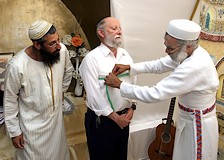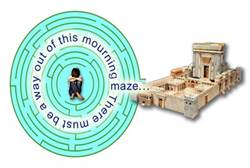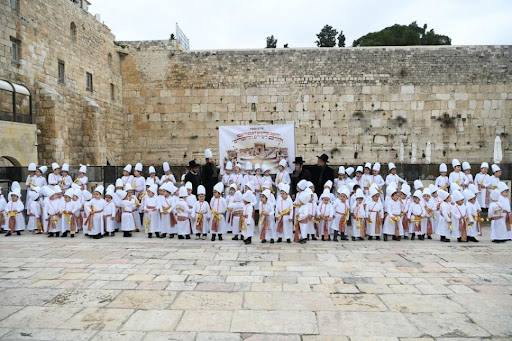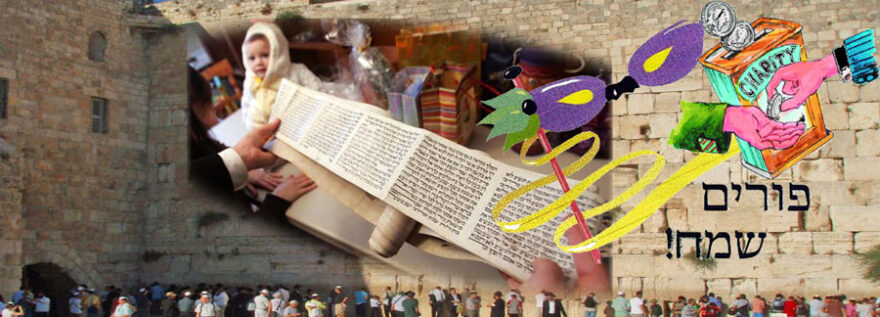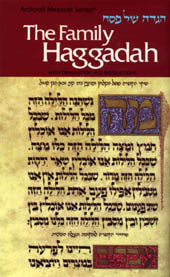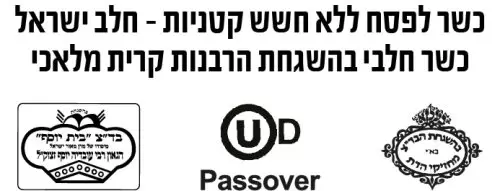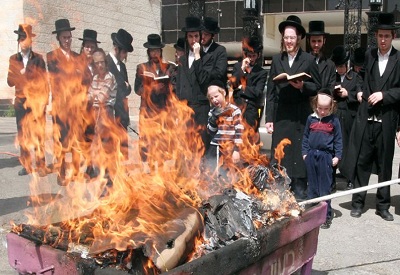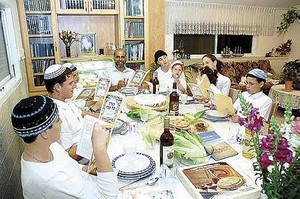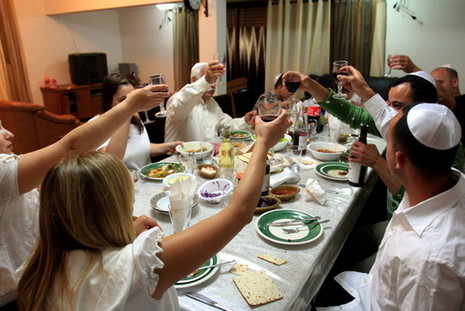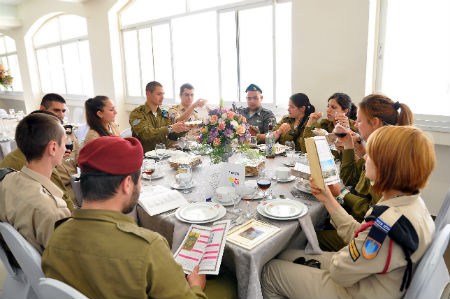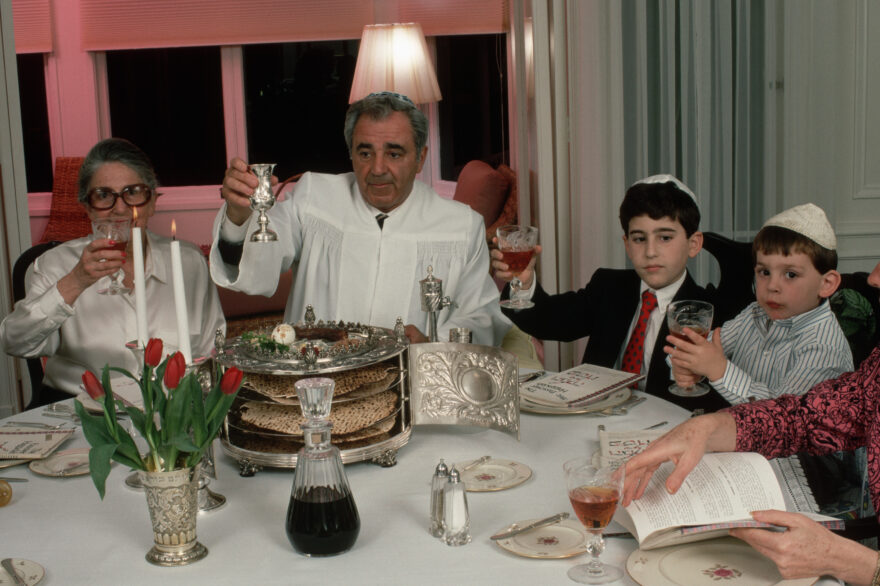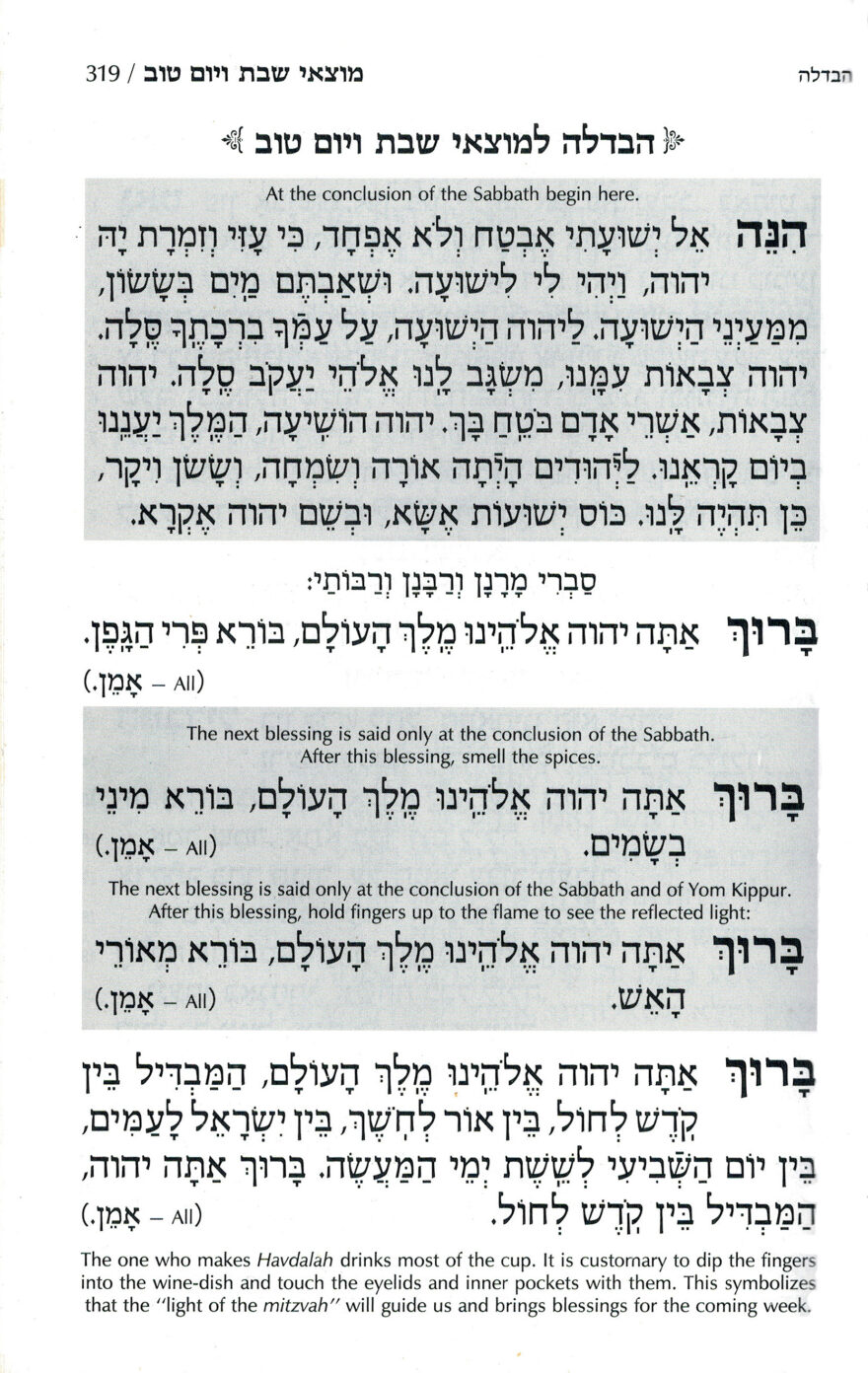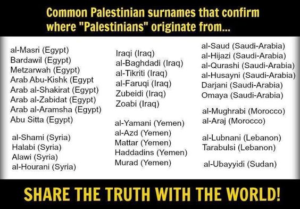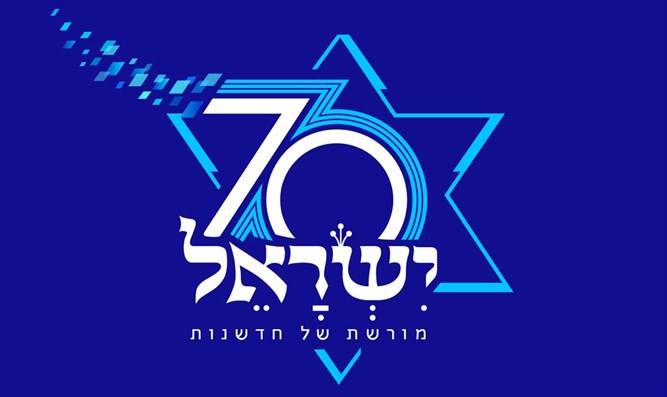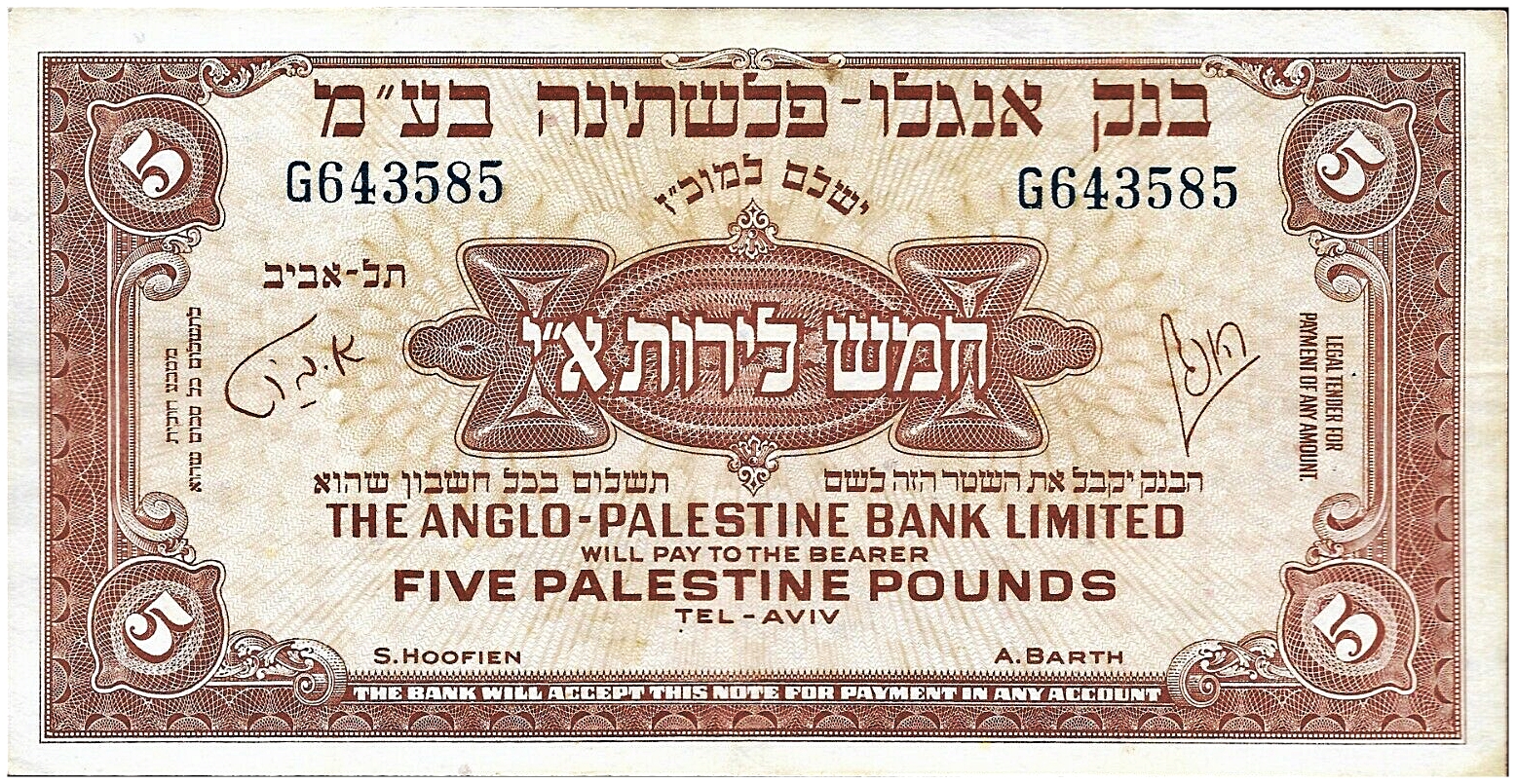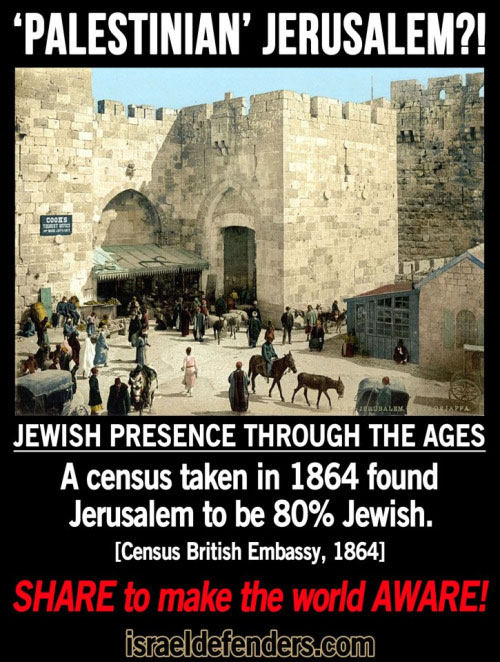DayenuFrom the Pesach Haggadah How many levels of favors has the Omnipresent One bestowed upon us: If He had brought us out from Egypt, and had not carried out judgments against them Dayenu, it would have sufficed us! If He had carried out judgments against them, and not against their idols Dayenu, it would have sufficed us! If He had destroyed their idols, and had not smitten their first-born Dayenu, it would have sufficed us! If He had smitten their first-born, and had not given us their wealth Dayenu, it would have sufficed us! If He had given us their wealth, and had not split the sea for us Dayenu, it would have sufficed us! If He had split the sea for us, and had not taken us through it on dry land Dayenu, it would have sufficed us! If He had taken us through the sea on dry land, and had not drowned our oppressors in it Dayenu, it would have sufficed us! If He had drowned our oppressors in it, and had not supplied our needs in the desert for forty years Dayenu, it would have sufficed us! If He had supplied our needs in the desert for forty years, and had not fed us the manna Dayenu, it would have sufficed us! If He had fed us the manna, and had not given us the Shabbat Dayenu, it would have sufficed us! If He had given us the Shabbat, and had not brought us before Mount Sinai Dayenu, it would have sufficed us! If He had brought us before Mount Sinai, and had not given us the Torah Dayenu, it would have sufficed us! If He had given us the Torah, and had not brought us into the land of Israel Dayenu, it would have sufficed us! If He had brought us into the land of Israel, and had not built for us the Beit Habechirah (Chosen House; the Beit Hamikdash) Dayenu, it would have sufficed us! Historic Omer Barley Offering Held in Jerusalem ט’ז ניסן תשע״ה Counting The Omer ספירת העומר As you can see from the last line of Dayenu which we say every Pesach (Passover) the Beit Hamikdash is the final step of ending the Exile. Pesach Tips and ScheduleCoronavirus and the search for chametz |
|
Has American Jewry lost their way? |
|
Historic Practice Passover Offering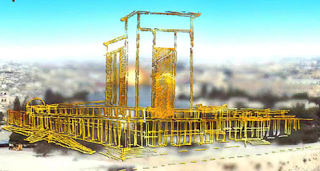 http://harhakodesh.co.il/ The Har Hakodesh (lit. “The Holy Mountain”) website includes educational material about the history of the Temple Mount, which was the site of the First Temple and Second Temple. The Temples were the focus of divine service for the Jewish nation. From Tomer Devorah: A Jewish website that aims to teach Israelis about the Temple has been met with an angry backlash from the Arab Muslim community. And of course; Muslim Anger over Virtual ‘Third Temple’ They need to grow up and to quote Golda Mier – Peace will come when the Arabs will love their children more than they hate us. |
|
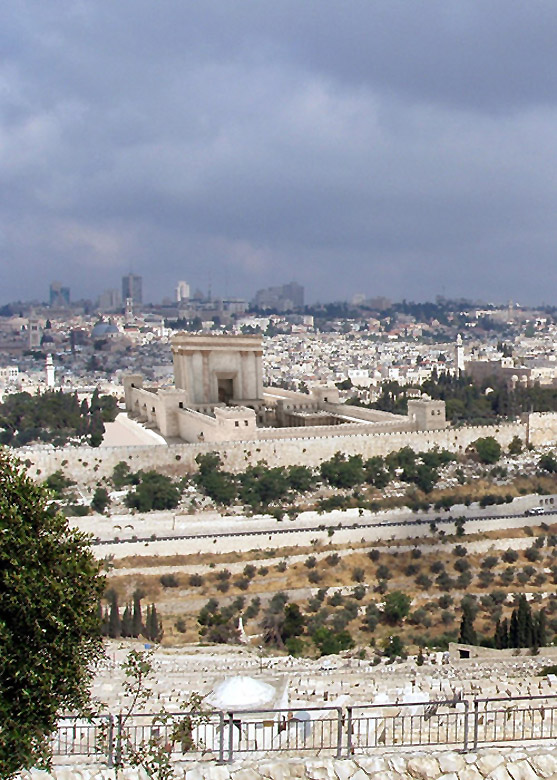 “בית מקדש שלישי בירושלים Third Beit HaMikdash Holy Temple in Jerusalem; And rebuild Jerusalem the holy city soon in our days! Blessed are You, O Lord, Who will rebuild Jerusalem in His mercy. The Temple institute is in a new location. The Temple Institute’s Holy Temple Visitors Center Bringing the Awesome World of the Holy Temple to an Unprecedented Level of Understanding The Temple Institute is delighted to announce that after twenty five years of introducing visitors the world over to the sacred vessels of the Holy Temple and the dream, along with the practical measures being taken for rebuilding the Holy Temple, our headquarters are now located in a new, expanded facility, which includes a brand new Visitors Center. Just a few hundred meters from our former location the new center is located just above the Yehudah HaLevy stairs which lead from Jerusalem’s Old City Jewish Quarter down to the Western Wall Plaza facing the Temple Mount. |
|
Historic Omer Barley Offering Held in Jerusalemט’ז ניסן תשע״ה On Saturday night/Sunday, the 16th of Nisan 5775, the Temple Institute, in cooperation with the Women on Behalf of the Holy Temple, performed a reenactment and training session for kohanim of the Omer harvesting and offering of the new barley crop in the land of Israel. The Omer offering is a Torah commandment to be performed every year in the Holy Temple. It marks the first day of the fifty day countdown between the start of Passover and the festival of Shavuot commemorating the receiving of Torah at Sinai. |
|
The Passover Recipe That You DON’T Want to Miss! |
|
Tisha B’Av 2013: The Children Are Ready II TEMPLE INSTITUTE |
|
 Nefesh B’Nefesh: Live the Dream US & CAN 1-866-4-ALIYAH | UK 020-8150-6690 or 0800-085-2105 | Israel 02-659-5800 https://www.nbn.org.il/ info@nbn.org.il It’s time to come home! Nefesh B’Nefesh: Live the Dream 1-866-4-ALIYAH |
|
Has American Jewry fallen to this with Pesach פסח (Passover)? An American Passover Greeting Card 2015 A family was ordering a McDonald’s like Clown Passover Happy Meal Voice on Speaker: “Welcome to the Seder Shack. May I take your order?” Father: “Yes, We’ll have three Matzo Meals, some Maror Nuggets with the special Seder Sauce, and a SuperSize kosher grape juice shake.” Son: “Dad, don’t forget the collectible Elijah cation figure!” The Card States: ” Passover in the not-so-distant future.” |
|
Of Stead of This for preparations for Pesach פסח (Passover)Celebrating Purim |
|
Planning for Pesach פסח (Passover) the Day after Purim |
|
Pesach Tips and Schedule
Cleaning for Pesach פסח (Passover). Remove all the Chametz and Don’t forget the Kitchen |
|
Shop for Pesach פסח (Passover)
|
|
Another reason to make Aliyah! Nefesh B’Nefesh: Live the Dream US & CAN 1-866-4-ALIYAH | UK 020-8150-6690 or 0800-085-2105 | Israel 02-659-5800 https://www.nbn.org.il/ info@nbn.org.il It’s time to come home! Nefesh B’Nefesh: Live the Dream 1-866-4-ALIYAH |
|
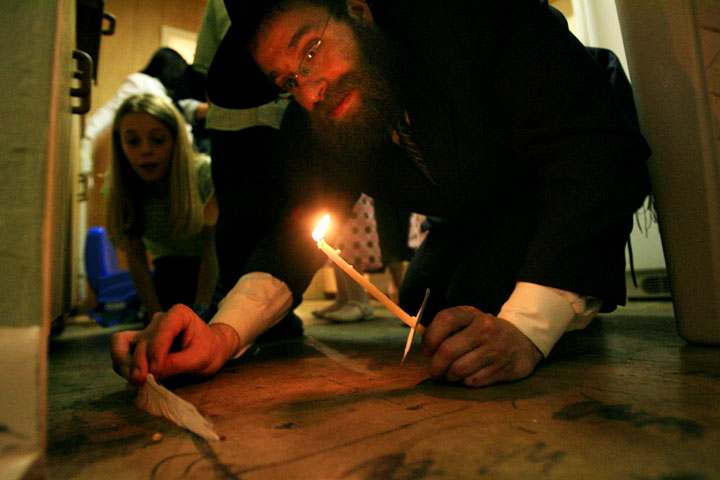 Rabbi Chaim Lazaroff, searches for leavened bread, also called chametz, at Chabad of Uptown April 17, 2008 in Houston. The candle is used to search for the chametz, while a feather is used to sweep it in to a wooden spoon. All three items are burned along with the chametz. The burning of leavened bread represents the eradication of the ego and all of the negative energies associated with the ego according to Jewish religious scripture. Pesach, or Passover, celebrates freedom. Egypt represents the limitation of ourselves. The observance of Passover is an exercise in being better today than we were yesterday and unleashing personal boundaries to drive ourselves to perfection. |
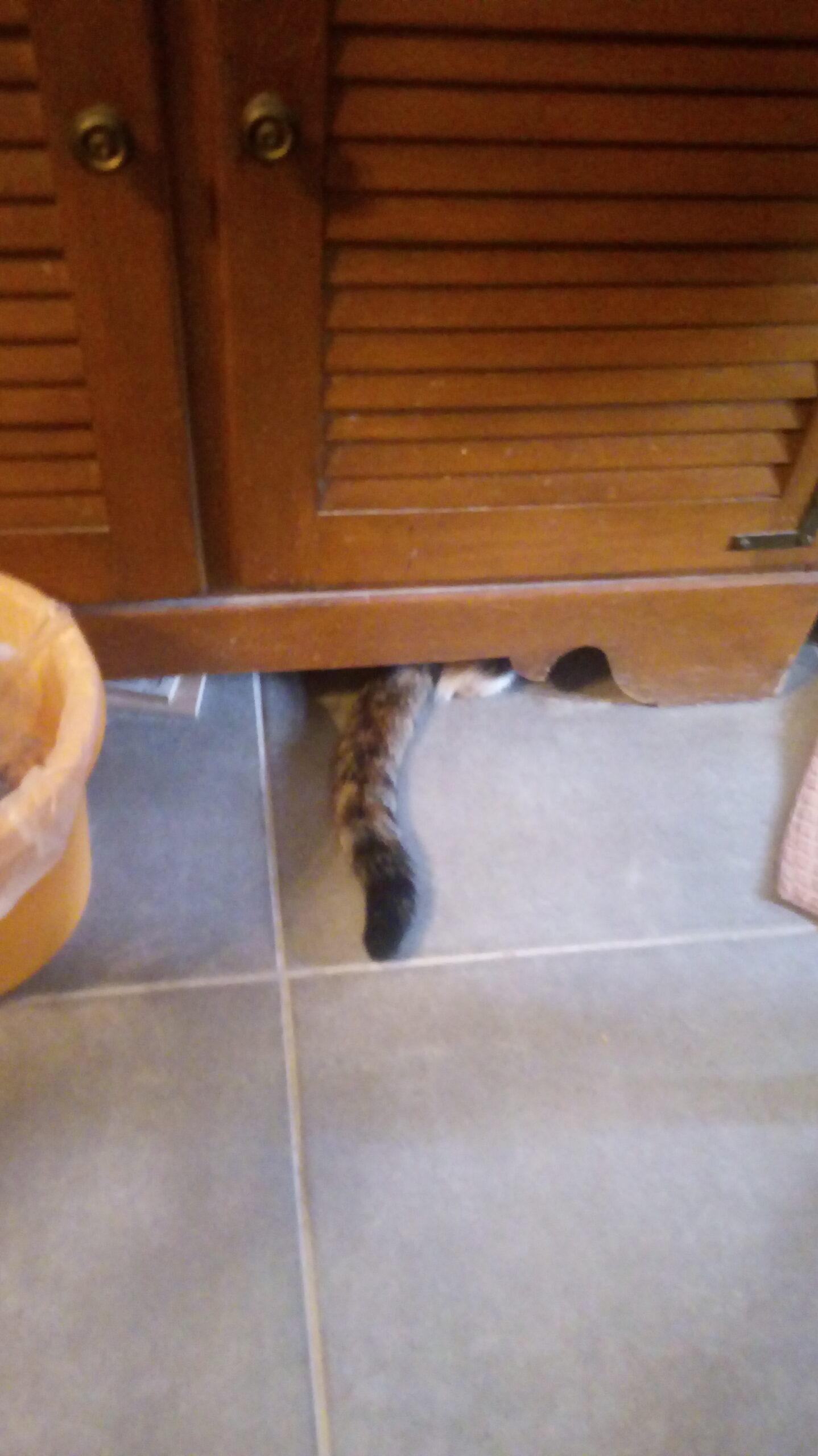 |
| 13 Nissan Did you remember to sell your chametz? Your local Chabad rabbi can help, or complete an online “Authorization for the Sale of Chametz” form by clicking here.Search for the chametz after dark (click here for the exact time). Recite the blessing prior to the search, and the nullification of the chametz (Kol Chamira) following the search. Click here for more information on the search and removal of chametz. | |
checking for Chametz the Night before The day before Pesach פסח (Passover)Daily Halachic Corner – 110 – CoronaVirus 17- Pesach – Rav Dayan Elgrod! |
|
Burning and Nullifying the Chametz the day before Pesach פסח (Passover)14 Nissan Burn your remaining (unsold) chametz before the fifth seasonal hour (click here for the exact time). When burning you chametz be sure to throw your iPhone or Smartphone into the fire. |
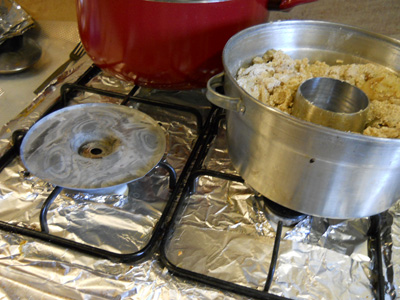 Place The Wonder Pot, סיר פלא, on top of the flame heat diffuser so that the bottom grove of the pot is on the rim of the flame heat diffuser. 14 Nissan Start Cooking for Pesach פסח (Passover) |
An Israeli Pesach Seder סדר פסח (Passover Seder)IDF Passover Seder |
|
At the Seder when you say “Next year in Jerusalem” really talk to your family about making Aliyah (immigration to Israel) and come on home to your real home and homeland!
 Nefesh B’Nefesh: Live the Dream US & CAN 1-866-4-ALIYAH | UK 020-8150-6690 or 0800-085-2105 | Israel 02-659-5800 https://www.nbn.org.il/ info@nbn.org.il It’s time to come home! Nefesh B’Nefesh: Live the Dream 1-866-4-ALIYAHNefesh B’Nefesh: Live the Dream US&CAN 1-866-4-ALIYAH UK 0800 075 7200 Israel 02-659-5800 www. nbn.org.il |
|
Holiday HavdalahWe Are Living The Passover StoryIsrael Defense Forces 08april2020 |
|
| -15 Nissan Pesach Night Light the Passover candles, reciting blessings 3 & 4. Click here for the blessings, and here for local candle-lighting times. Click here for a summary of the laws of Yom Tov. Pesach Seder סדר פסח (Passover Seder): The Seder contains the observance of many biblical and rabbinical mitzvot, including: eating matzah, eating maror (bitter herbs), drinking four cups of wine, relating the story of the Exodus to our children, reclining as a symbol of freedom, etc. (Click here for a How-To Seder guide.)To locate a public Seder near you, please click here.The first night of Passover is referred to as leil shimurim (a night of guarding), based on Exodus 12:42. |
|
| —15 Nissan Pesach Morning 1st day of Passover Morning service. Full Hallel is recited. Two Torah scrolls are taken out of the ark. Torah reading: Exodus 12:21–51 and Numbers 28:16–25. Haftorah: Joshua 3:5–7, 5:2–6:1, 6:27.Beginning with the Musaf Amidah, we recite morid hatal, the prayer for dew, and we omit the prayer for rain. This practice continues until Shemini Atzeret, the day after Sukkot.The priests bless the congregation with the priestly blessing during the Musaf prayer.Festive lunch meal.According to Chabad custom, complete Hallel is recited during Maariv evening prayers, followed by the “Counting of the Omer.” We count the 1st day of the Omer. The counting of the Omer is recited during each of the next 49 days, leading up to the holiday of Shavuot on the 50th day. The 49 days embody the 49 steps of self-improvement—beginning with the departure from our “personal” Egypt, until our arrival at Mount Sinai, when we are ready to accept the wisdom of the Torah. —16 Nissan Pesach Night If you live in Eretz Israel You have 1st Night of Chol Hamoed Pesach (intermediate days)If you live outside of Eretz Israel You have a Second Seder: After dark, light candles for the second day of Passover, using an existing flame, and recite blessings 2 & 4. Click here for the blessings, and here for local candle-lighting times.The Seder contains the observance of many biblical and rabbinical mitzvot, including: eating matzah, eating maror (bitter herbs), drinking four cups of wine, relating the story of the Exodus to our children, reclining as a symbol of freedom, etc. (Click here for a How-To Seder guide.) Havdalah is incorporated into the Kiddush prayer. We look at the holiday candles for the blessing on fire and do not recite the blessing on spices. |
|
At the Seder when you say “Next year in Jerusalem” really talk to your family about making Aliyah (immigration to Israel) and come on home to your real home and homeland!
 Nefesh B’Nefesh: Live the Dream US & CAN 1-866-4-ALIYAH | UK 020-8150-6690 or 0800-085-2105 | Israel 02-659-5800 https://www.nbn.org.il/ info@nbn.org.il It’s time to come home! Nefesh B’Nefesh: Live the Dream 1-866-4-ALIYAHNefesh B’Nefesh: Live the Dream US&CAN 1-866-4-ALIYAH UK 0800 075 7200 Israel 02-659-5800 www. nbn.org.il |
|
Holiday HavdalahBy Naftali Silberberg Holiday havdalah can be divided into two categories: 1) Havdalah recited at the conclusion of a holiday. 2) The special havdalah recited on a holiday which falls on Saturday night. Havdalah is made when entering a day of lesser holiness. Since Shabbat is holier than all the holidays, we recite the havdalah when Shabbat leads into a holiday. Following the same logic, havdalah is not recited if a holiday leads into Shabbat. Havdalah at the Conclusion of a Holiday
Havdalah is recited at the conclusion of the following biblical holidays: Rosh Hashanah; Yom Kippur; the first days of Sukkot; Simchat Torah; Passover, both its first and last days; and Shavuot. If the final day of the holiday was Shabbat, then the exact same havdalah procedure as a typical Saturday night is followed. If the holiday ended on another weeknight, the procedure is very similar to the Shabbat havdalah, but with some differences:
Havdalah From Shabbat to a Holiday (“Yaknahaz”)Whether a holiday begins on a Saturday night or if Saturday night ushers in the second day of a holiday, that night’s holiday kiddush incorporates within itself the havdalah for Shabbat as well. The whole text of the kiddush/havdalah can be found in your standard or holiday prayer book. The following is the basic procedure:
Note: There are many activities which are forbidden on Shabbat but permissible on a holiday. All such activities must wait until one verbally “separates” between Shabbat and the holiday. This, however, does not have to wait for kiddush/havdalah, as a special havdalah themed insert, the Vatodi’enu paragraph, is inserted in the Amidah of the night’s prayers. Alternatively, one can say: “Baruch hamavdil bayn kodesh likodesh” — “Blessed is the One who separates between (the) holiness (of Shabbat) and (the) holiness (of the holiday).” Rabbi Naftali Silberberg is a writer, editor and director of the curriculum department at the Rohr Jewish Learning Institute. Rabbi Silberberg resides in Brooklyn, New York, with his wife, Chaya Mushka, and their three children. Click to Enlarge |
|

